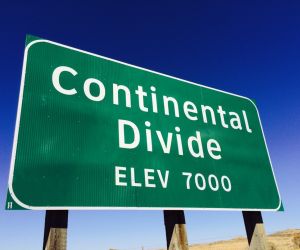Divides

Scale. The scale of the West is the enduring memory. Colin summarized east/central Wyoming thusly last year. “I looked out the window and then started watching a movie. When the movie ended, I looked out the window and couldn’t tell if we had moved.” The Jeep would have traveled at least 150 miles while the movie played, but the sagebrush looked the same, and the mountains didn’t seem closer. Here’s another example of scale. This year I learned you can drive from the banks of the Mississippi River in Davenport to the shore of Lake Michigan in Chicago faster than you can drive through a single park in Wyoming.
To be fair, the park is Yellowstone National Park; 3,500 square miles of otherworldly beauty, tucked into the northwest corner of the Cowboy State. Together with its southern neighbor Grand Teton National Park, how Wyoming remains America’s least populous state is a mystery. Once past the sagebrush sea, spectacular in its own regard, the unspoiled exquisiteness of the Continental Divide would seem a clarion call. But the emptiness of Wyoming and the American West is vast. Thank goodness for the 80 mph speed limit.
In theory, you’d expect to cross the Continental Divide twice on a trip from Iowa to Seattle and back. Once heading west and once heading back. But I count six Continental Divide signs each way. The three signs in Yellowstone are understandable, since I’m heading north, and the one on I-90 makes sense because it’s a different road than I-80. But the two Continental Divide signs on I-80, separated by more than forty miles, are quite confusing. Where does the rain go which falls in the forty some miles between the two signs? While the scale of the West allows ample time for thought, I’m sorry to report it wasn’t ample enough for me to figure it out.
The Googler explains the dual divides define the Great Divide Basin, a place where rain never reaches the Atlantic or Pacific oceans. I could have stayed home or wandered into any wi-fi hot spot to learn that. But I would have never known the answer without the question being placed before me. Such is the trail to wisdom. Learning occurs with each step.
The long hours in the three-way adjustable saddle expose the big questions along with the small. Where does the rain go? Why do Idaho “Wildlife Crossing” signs say “Game Crossing” instead? What is the fascination with covering hay in Washington? What is the essence of the West and what contributions has it made to the American character? What combination of saddle settings will be comfortable until the next stop for gas? How the heck did Lewis and Clark do this?
The Corps of Discovery had Sacagawea. I have the search function on the radio as translator. Sacagawea spoke Hidatsa and Shoshone. Except for the ultra-hip sampling of KHOL in Jackson, the radio speaks Country and Christian. I take this AM/FM language of the West to be a function of the scale. You can’t experience the limitlessness of the West without knowing what it is to be utterly alone, independent and free. Whether on the plains or in the mountains, no one is stopping you from doing what you want to do. They are just not there to do it, and even if they were, they’d think it sacrilegious to fence you in. The frontier is freedom, and though some say the frontier closed in the 1890’s, the freedom of America still dwells in the West.
The Country / Christian playlist also tells a deeper tale of freedom. To be alone and have as much freedom as you could possibly desire brings the human condition to the fore. Freedom is bliss. Freedom is lonely. Cowboys are famously lonely, and the songs on the radio promise the varying salvations of faithful friend, good woman, cold beer or loving Lord. Home comes in many forms, but home is ever the goal.
I’m reminded of this, in of all places, a McDonald’s. Late night dining choices are what they are, so the quick stop at the golden arches in Bozeman won’t be remembered for the culinary offerings. But the foursome of high schools girls stopping in post-dance was memorable. From the calves up, they could have been girls from any high school in America. Bright and cute dresses, laughing and talking, they’d fit in anywhere. On the road and trail for days, they make you homesick, since their fancy cowgirl boots make it clear you’re still somewhere west of where you started.
The scale is vast but the time covering the distance alone helps focus the mind. The scale of freedom and loneliness has me thinking about whether I’ve said thank you enough, or I love you enough, back home. On some Western plain it comes to me the mountain ridges I’ve counted aren’t the meaningful divides.
John Muir advised; “Climb the mountains and get their good tidings. Nature's peace will flow into you as sunshine flows into trees.” My peace came in understanding the divides we create in our minds are anything but insurmountable.
Happy trails, all.

